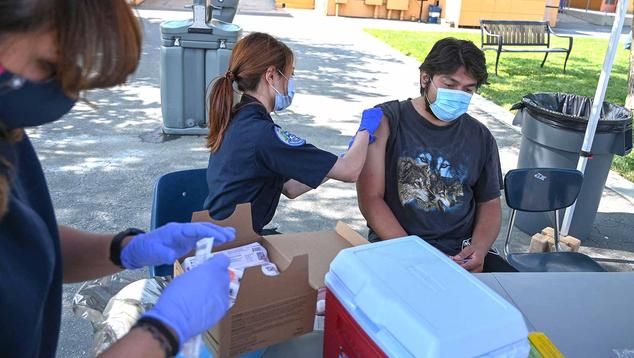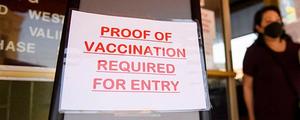How do you enforce a mandate when a significant percentage of the population opposes it? That's the question President Joe Biden faces as he rolls out his new plan to mandate the vaccination of all federal employees, along with a new emergency rule that will compel all private companies with 100 or more employees to require that their employees be vaccinated or submit to weekly COVID-19 tests.
A majority of U.S. adults support the idea of requiring employees to be vaccinated -- as we have previously reported -- but it is by no means a supermajority. Gallup Panel data collected Aug. 16-22 found 56% of Americans in favor of requiring workers to show proof of vaccination before reporting to an office or work site, and 44% opposed. A separate Gallup Panel survey found 52% of workers supporting the idea of their employer requiring all workers without a medical exemption to be vaccinated, with 38% opposed. Neither of these studies mentioned that workers could opt for weekly testing in lieu of vaccination or that it would be a government-backed mandate.
The most recent polling by other organizations finds similar results, across several different ways of asking the question.
- Quinnipiac's latest poll asked, "As you may know, President Biden's plan mandates that employers with more than 100 employees must require that all employees receive a COVID-19 vaccine or undergo at least weekly testing -- do you approve or disapprove of this mandate?" and showed 53% support, 46% opposition.
- A CNN poll conducted Aug. 3-Sept. 7 found 54% support and 46% opposition on this issue, describing the policy as requiring "an office worker to be vaccinated against coronavirus to return to their workplace."
- An Axios-Ipsos poll (Sept. 10-13) found 60% supporting and 39% opposing "a federal government rule that all businesses with 100 or more employees require all staff to be vaccinated or undergo regular COVID testing."
- A Politico-Morning Consult poll conducted Sept. 10-13 found 58% in favor and 34% opposed, using this wording: "As you may know, President Biden recently released a plan to boost COVID-19 vaccinations. Based on what you know, do you support or oppose the following measures? Requiring all employers with 100 or more employees to mandate COVID-19 vaccinations or weekly testing."
In summary, available data at this point show that between 53% and 60% of Americans support the concept of vaccination requirements for employees. In one sense, assuming a majoritarian approach to governing, the Biden administration could relax and welcome the fact that over half of the nation supports the policy. On the other hand, there is fierce and public opposition to the mandate among many Republican leaders, and as Politico recently summarized, "The potential for legal challenges, union contract disputes and the logistical hurdles underscore the difficulty for the administration to quickly implement a sweeping mandate." A CNN report succinctly noted, "The big question on the minds of many is: Will mandating vaccines work?"
In an ideal world, the Biden administration would like to move the numbers and increase acceptance of their mandate proposal into supermajority territory. The question becomes how this is best accomplished. It's clear the challenge is mainly focused on changing the minds of Republicans and Republican-leaning independents, given that Gallup data show only a fraction of those in opposition to the policy are Democrats.
There is a large literature on the art and science of changing people's minds, a topic on which I am certainly no expert. But there does appear to be fairly widespread agreement that a direct focus on presenting facts and figures as the basis for shifting opinion is often not the most effective strategy. The literature instead focuses on the effectiveness of understanding and taking into account the beliefs that undergird opinions.
As Harvard psychologist Steven Pinker recently told The New York Times, "People hold beliefs not because they are provably true or false, but because they are uplifting, they're empowering, they are good stories." In other words, beliefs can be reinforcing in and of themselves, regardless of whether they are factually true. The effectiveness of attempts to increase support for a vaccine mandate will depend in large part on the degree to which such efforts can connect with the underlying beliefs that lie behind anti-mandate and anti-vaccine attitudes.
Some of these beliefs are not easy to change. Biden is a Democrat, and essentially by definition those who are not Democrats will have a high probability of opposing any policy or executive order he promulgates.
Then, there are Americans' underlying beliefs on vaccination per se. Some of the opposition to a vaccine mandate is based on the fact that individuals themselves do not believe in vaccination or do not want to personally be vaccinated. But this is by no means the whole story. As I recently pointed out, "Between 20% and 32% of Americans give seemingly contradictory opinions -- vaccinated people who say there should be no vaccination requirements to do these activities, and unvaccinated people who say there should be. Apparently, for a number of Americans, the personal decision to get vaccinated is independent of their views on whether such actions should be required by businesses and employers." The beliefs that undergird opposition to mandates, in other words, go beyond straightforward vaccine hesitancy.
One underlying belief no doubt related to Americans' resistance to a vaccine mandate is generalized opposition to government intrusion into their lives. The desire for personal liberty and freedom has been a part of American culture since the nation's founding -- and has recently been expressed by leaders such as Texas Gov. Greg Abbott, whose spokesperson said in a statement, "Every Texan has a right to choose for themselves and their children whether they will wear masks, open their businesses or get vaccinated."
We don't have a precise measure of opposition to government intrusion among those who object to the vaccine measure, but Gallup data show it is much higher among Republicans than among others. Given a choice, 74% of Republicans say the government is trying to do too many things that should be left to individuals, and as noted, Republicans are those most likely to oppose vaccination and mandates.
Another factor in opposition to the vaccine mandate, I believe, is antipathy toward science (and education). We don't have data that measure these attitudes specifically among mandate opposers, but it is clear that Republicans -- who are overwhelmingly opposed to the mandate -- are much less confident in science than are independents or Democrats, and they are much less positive about education in general and higher education in particular.
This is important. Science and the academic, scholarly process behind science are the sources of most of the information used as the basis for determining the efficacy of vaccinations and, in turn, vaccination mandates. Very few Americans can make judgments about COVID-related science for themselves, and we must therefore rely on external sources of information. An underlying skepticism about science increases the tendency to discount reports about what science and evidence say -- and increases reliance on other sources of information such as like-minded politicians and ideologically compatible media.
Of course, it is not hard to see how a questioning view of what science tells us about vaccines could arise. The current disputations among various scientists and doctors concerning the necessity for booster shots highlight the fact that science is an evolving process that operates by developing hypotheses, examining data, reviewing and then revising as necessary. Science is often a matter of probabilities rather than certainties, and this process -- if not fully understood -- could lead to and reinforce skepticism about scientific conclusions.
More broadly, Republicans (the most likely to be mandate-skeptical) are not only less likely to be confident in science but also remarkably less positive about many other business and industry sectors in this country today. As my colleague Lydia Saad recently pointed out, these partisan differences are particularly large when it comes to the internet and information sectors. Why Republicans currently have an unusually negative view of a long list of business and industry sectors is not totally clear, although some of this is tied into a populist view that society is being illegitimately controlled by elites, experts, liberals and intellectuals. This cynicism about institutions can lead to a broad cynicism about the messaging that emanates from any large entity, particularly the federal government and the media.
Bottom Line
Biden recently met with business leaders in an attempt to build support for his proposed vaccine mandates, but it will take more than that to build support among the large minority of rank-and-file Americans who oppose vaccine requirements. Biden has to deal not only with the fact that many of those opposed are Republicans and therefore disinclined to support any policy he puts forth, but also with underlying belief structures that embody opposition to government intrusion and intervention in general and that embody skepticism about the work of elite scientists and educators.
Kaiser Family Foundation polling this summer followed up with individuals who were personally opposed to getting vaccinated in January but who had in fact gotten the shot by the time of the second contact in July. As Kaiser notes, the reasons given by these individuals for changing their minds included "seeing their friends and family members get vaccinated without serious side effects, talking to family members about being able to safely visit, and conversations with their personal doctors about their own risks were all persuasive factors for these individuals." None of these explanations focus directly on having received new scientific evidence or persuasion by national elites, but instead rest on the influence of trusted associates at the local level.
A Biden administration effort to harness this type of local network power to affect attitudes toward vaccine mandates could be a plausible path forward, although its effectuation presents practical challenges. Most generally, it appears that changing Americans' minds on mandates is not going to be easy, and it may be that Biden will need to reconcile himself to the continued opposition of a significant percentage of the American people.




